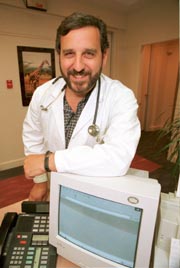
| ||
 | ||
 Dr. Barry Slapcoff PHOTO: OWEN EGAN |
Wiser web use
|
OWEN EGAN | A few years ago, an outbreak of self-diagnosis hit Dr. Barry Slapcoff's patients.
With nothing more than a couple of symptoms and a web-browser, patients had been turning to the Internet to figure out what ailed them, even before consulting their doctor. They would peruse a few of the countless web sites that offer medical information, then arrive at Slapcoff's office, diagnosis at the ready, looking for the MD's stamp of approval. Slapcoff, the undergraduate coordinator of the Family Medicine Department at St. Mary's Hospital, started to check out his patients' information sources. It became clear that despite many excellent medical resources available on the net, there was also no shortage of incorrect information, deceptive marketing practices and plain old quackery. Slapcoff thought his young, web-savvy medical students might be able to help the situation. "I thought it would be an interesting project for my students to develop a set of criteria we could use to evaluate these web sites for our patients," Slapcoff says. "Ultimately, the patients would benefit by having a list of reviewed sites containing accurate information, and the medical students would learn by having to do the work." So far, a group of 10 medical students has finished reviewing 30 web sites. Each site is scored on criteria such as accuracy of content, ease-of-use, aesthetics and frequency of updates. The "sponsor" of each site is noted, since a drug company may present a very different approach to treatment than a university medical faculty or other non-commercial organization. Slapcoff hopes the project will become self-perpetuating, with new classes of medical students picking up where the last left off, constantly updating and adding to the list of reviewed sites. "My goal is to come up with a list of specific recommended web sites, as well as a separate list of criteria to help patients evaluate web sites they find on their own," Slapcoff says. Certain diseases or conditions seem to breed more web-based misinformation than others. Any area where traditional medicine doesn't have all the answers seems to encourage alternative therapies -- some of which are at best pointless, at worst, harmful. Slapcoff gives the examples of hyperactivity and ADD (Attention Deficit Disorder). "It's an area where there are many theories about why it happens and how it works," he says. "I see people come in with information about all sorts of bizarre diets and bizarre behavioural techniques that are unproven as yet." So far, Slapcoff says, he hasn't heard of any disastrous consequences of patients' self-diagnosing or following advice from questionable sources, but "you can speculate that these things have happened and will happen," he says. The consequences he has seen -- misdiagnoses, wasted money, and inappropriate treatments -- are enough to motivate him and his students to continue their work rating web sites and educating patients. Slapcoff has to think for a moment when asked whether patients are better off, overall, for having ready access to the net's morass of medical information and misinformation. "Yes," he says finally. "The more information people have, the more power they have to make their own decisions. There's a fantastic amount of good quality information out there, well maintained and up-to-date, written by people who are experts in their fields. The net has certainly made patients more informed consumers of health care." But, he adds, patients need to be able to trust their family physicians and their specialists more than they trust a web page. Patients should try to restrict the sources of their medical information to either national or well-recognized organizations and to avoid being swayed by personal testimonials or the power of the anecdote. The current goal for Slapcoff and his students is a simple sheet or two to be handed out to patients to help them find reliable medical information online. Eventually, Slapcoff intends to return the entire collection of web site reviews to its natural habitat -- the web.
|
|
| |||||